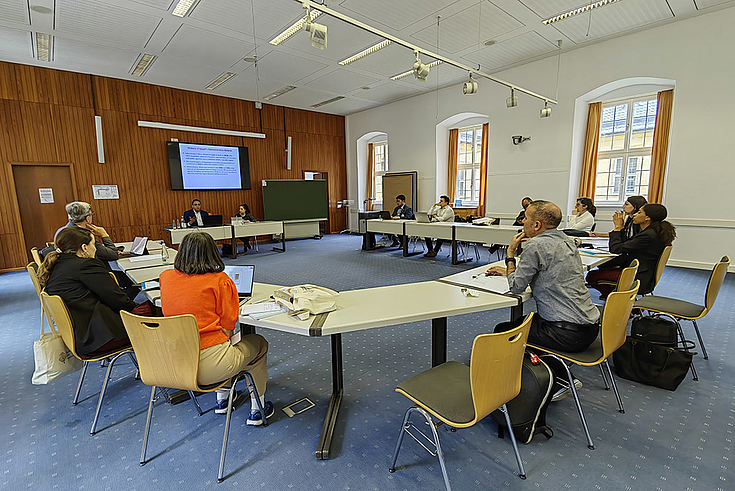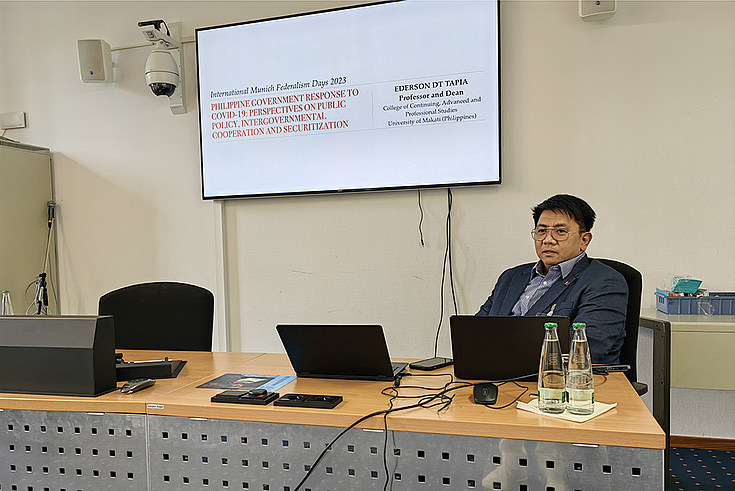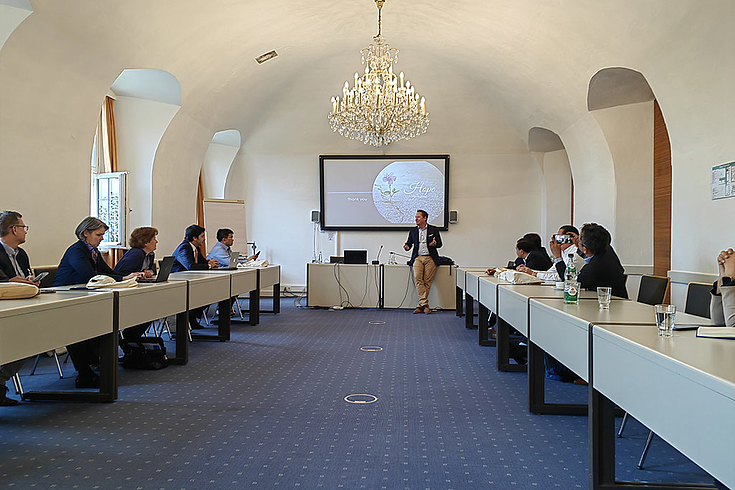International Munich Federalism Days 2023
Studying Crisis Management amidst Governance in Multitiered Systems
HSF
The International Munich Federalism Days (IMFD) 2023 gathered in Bavaria, Germany, representatives from various federal and federal-like governments, and from those aspiring to shift to a similar system, as well as federalism and decentralisation experts to take on the topic of crisis management. The idea was for the participants to examine through roundtable discussions and workshops different crises as experienced and responded to in their respective countries, as well as explore collaborative solutions.
The International Munich Federalism Days 2023 commenced with a focus on the significance of federalism-constitutionalism in democratic governance, emphasising the need for a conducive socio-political environment for federalism to thrive. The keynote address set the stage for discussions on the complexities of federal systems, highlighting key elements such as adaptiveness, consultation, inclusive education, innovation, and transparency. The subsequent panel session probed Germany's governmental perspective, showcasing how the executive, legislative, and judicial branches navigate crises and challenges while fostering collaboration for progress.
The event's structure included roundtable discussions that shed light on the roles of government branches and civil society within a multilevel system, particularly in responding to crises. These discussions analysed the intricate contexts in which these entities operate and encouraged a deeper examination of their performance and collective problem-solving efforts. Additionally, parallel country sessions provided a diverse and engaging platform for presenters to scrutinise specific country situations, offering insights into intergovernmental mechanisms, governance challenges, and innovative practices across different nations.
“Only when federalism is combined with constitutionalism can it provide effective, democratic and legitimate governance.” – Francesco Palermo
Noteworthy sessions during the event included discussions on decentralisation, constitutionalism, and participatory budgeting, with a focus on lessons from countries like Egypt, Pakistan, and Tunisia that could guide the Philippines in its federalism journey.
HSF
Professor and Dean Ederson DL Trino Tapia, one of the Philippine delegates, shared insights on “Philippine Government Response to COVID-19: Perspectives on Public Policy, Intergovernmental Cooperation and Securitization” in one of the parallel country sessions. The workshop delved into the Philippine government's response to the COVID-19 crisis, examining securitization, public policy initiatives, and intergovernmental relations. It highlighted the government's comprehensive strategy to combat the pandemic, focusing on containment measures and social protection support for vulnerable groups. The presentation also discussed intergovernmental coordination challenges and included a cross-country comparison, revealing areas for improvement. Mainly, the workshop shed light on the complexities of crisis management and multilevel governance systems, emphasising the need for innovative practices, improved coordination, and potential policy shifts to enhance future responses to crises like the COVID-19 pandemic.
Overall, the importance of political will, participatory leadership, and an engaged citizenry emerged from the conference discussions as crucial factors for successful governance reforms. The emphasis on participatory budgeting highlighted the need for policymakers to embrace it and for citizens to have the necessary budget literacy to actively participate in shaping budgetary decisions. The Regional Sessions provided a platform for collaborative idea generation and future initiative planning, fostering dialogue, collaboration, and potential joint projects amongst participants from different regions.
“Federalism can provide opportunities for regional autonomy, inclusive development, and localized decision-making. Crisis management systems that involve intergovernmental cooperation and civil society participation can enhance resilience and responsiveness.” – Ederson Tapia
Having its Head Office in Munich, the Free State of Bavaria, one of Germany’s sixteen federal states, the Hanns Seidel Foundation (HSF), proud of the achievements of its state and people, continues initiating means through which it can share about Bavaria’s positive experience with multilevel governance. The IMFD is one such initiative. Complimentarily, it seeks to provide a space for international exchange and discourse on pressing common issues as they relate to various decentralised systems of government.
HSF
The International Munich Federalism Days (IMFD) successfully facilitated structured and intentional exchanges, fostering meaningful dialogues and dynamic interactions among speakers, presenters, and participants while seamlessly blending their perspectives. This evolution in event organization, stemming from previous iterations, showcased a remarkable development in creating a conducive environment for open discussions and reciprocal sharing of experiences. From the strategic program flow to inclusive social activities like the welcoming lunch reception at the Hanns Seidel Foundation (HSF) Headquarters, the emphasis on information exchange and diverse perspectives set the tone for engaging conversations on sensitive topics, promoting a sense of safety and openness among attendees.
The roundtable discussions and workshops provided platforms for objective and insightful discussions, enabling experts and participants to dive deep into analyses, share viewpoints, and maximize convergence on complex issues. The comprehensive organisational information, including visits to local governance entities like the Lichtenfels District Administrator, offered valuable insights typically inaccessible, enriching participants' understanding of governance practices.
Noteworthy additions such as the Pub Quiz and cultural visits to places like the Fourteen Saints Basilica (Basilika Vierzehnheiligen) added a fun and enriching dimension to the event, enhancing the learning experience and providing a holistic view of crises management and complex governance concepts, making the week-long event a blend of informative sessions and interactive experiences that fostered a sense of community and shared learning.
The HSF has been gathering experts and practitioners from countries of varied systems of government to exchange experiences and insights about federalism since 2012 through the organisation of the IMFD in Germany. Now on its sixth run, this is the third IMFD organised in cooperation with the Eurac Research since 2017.



